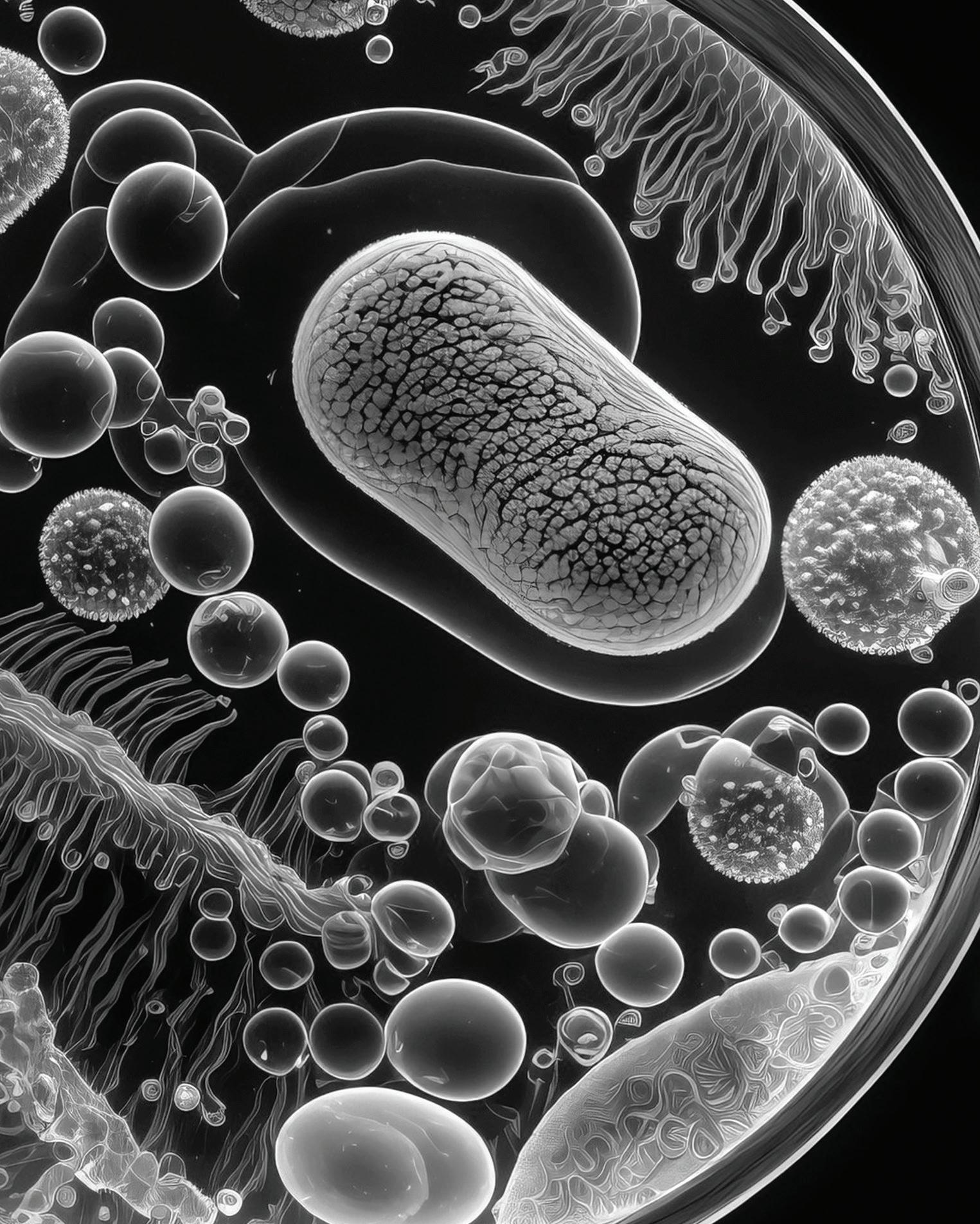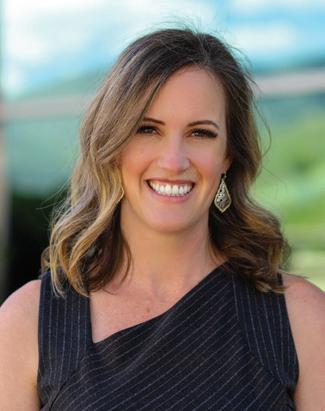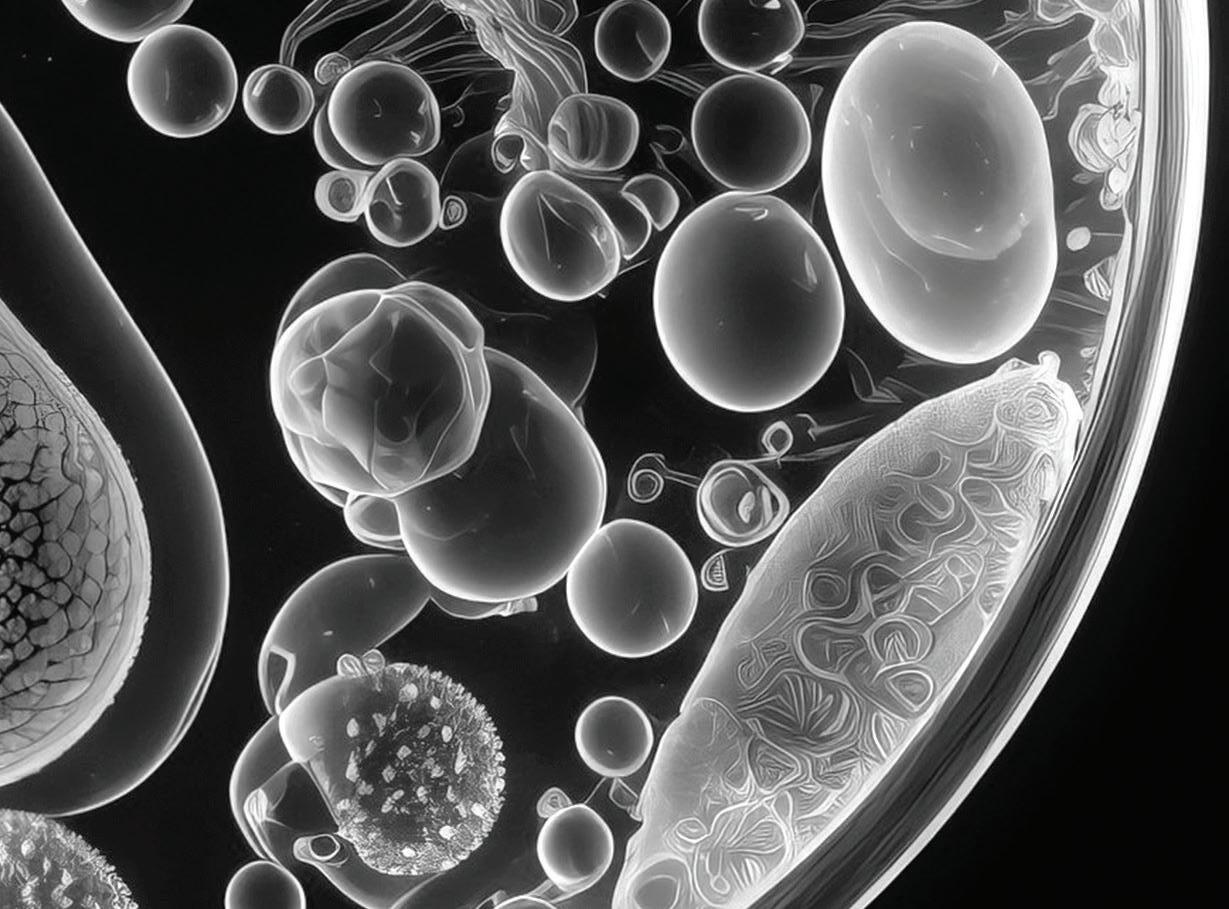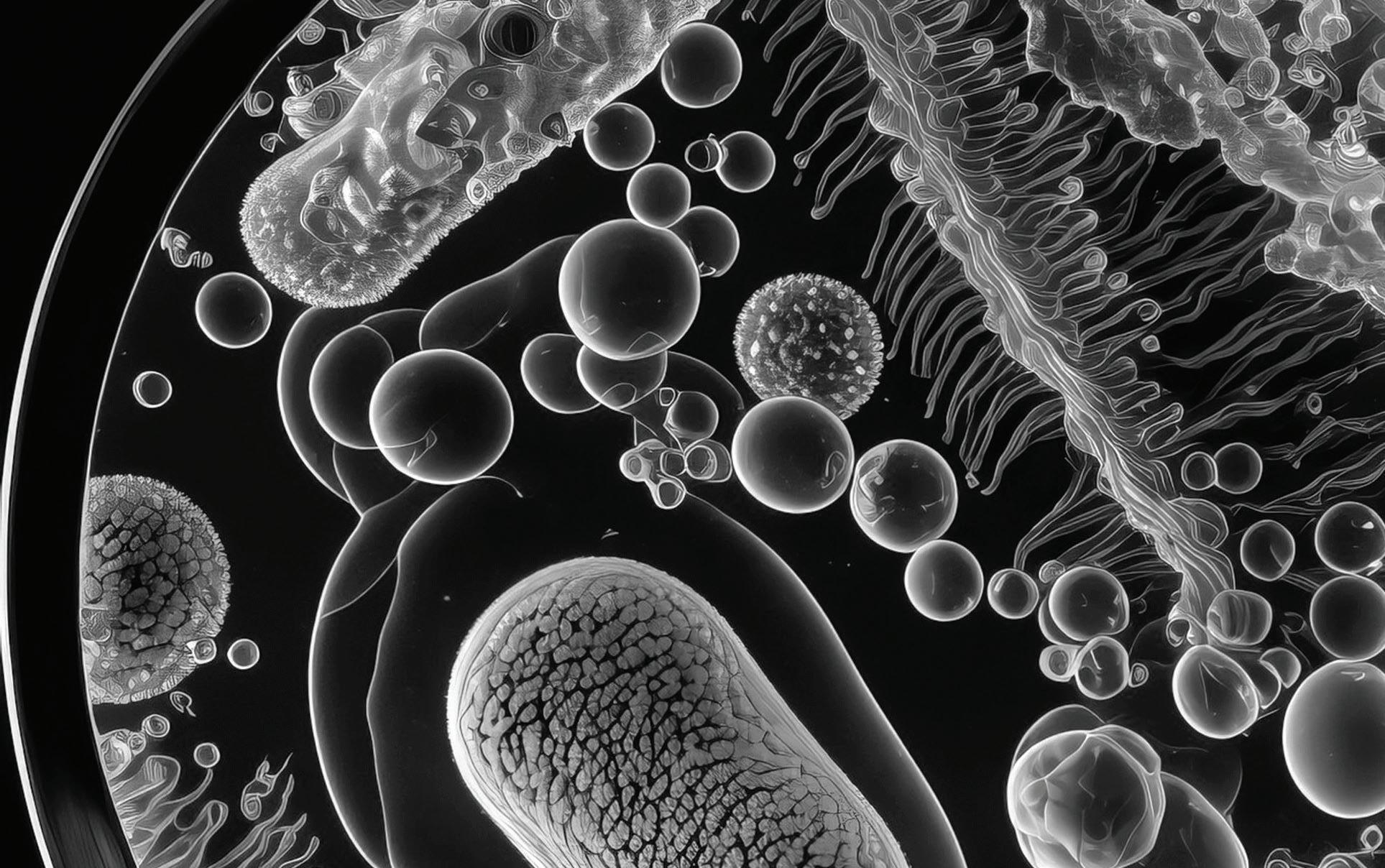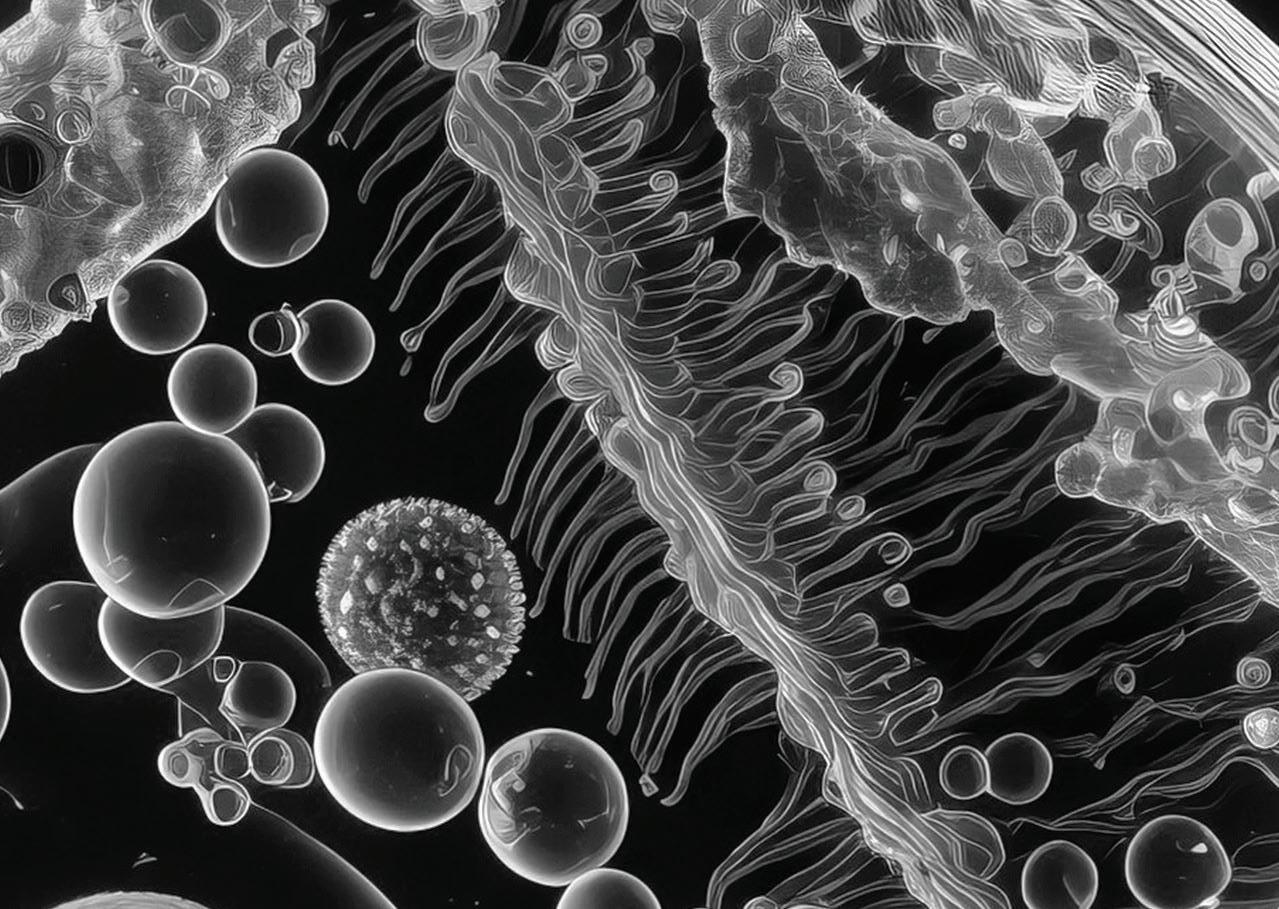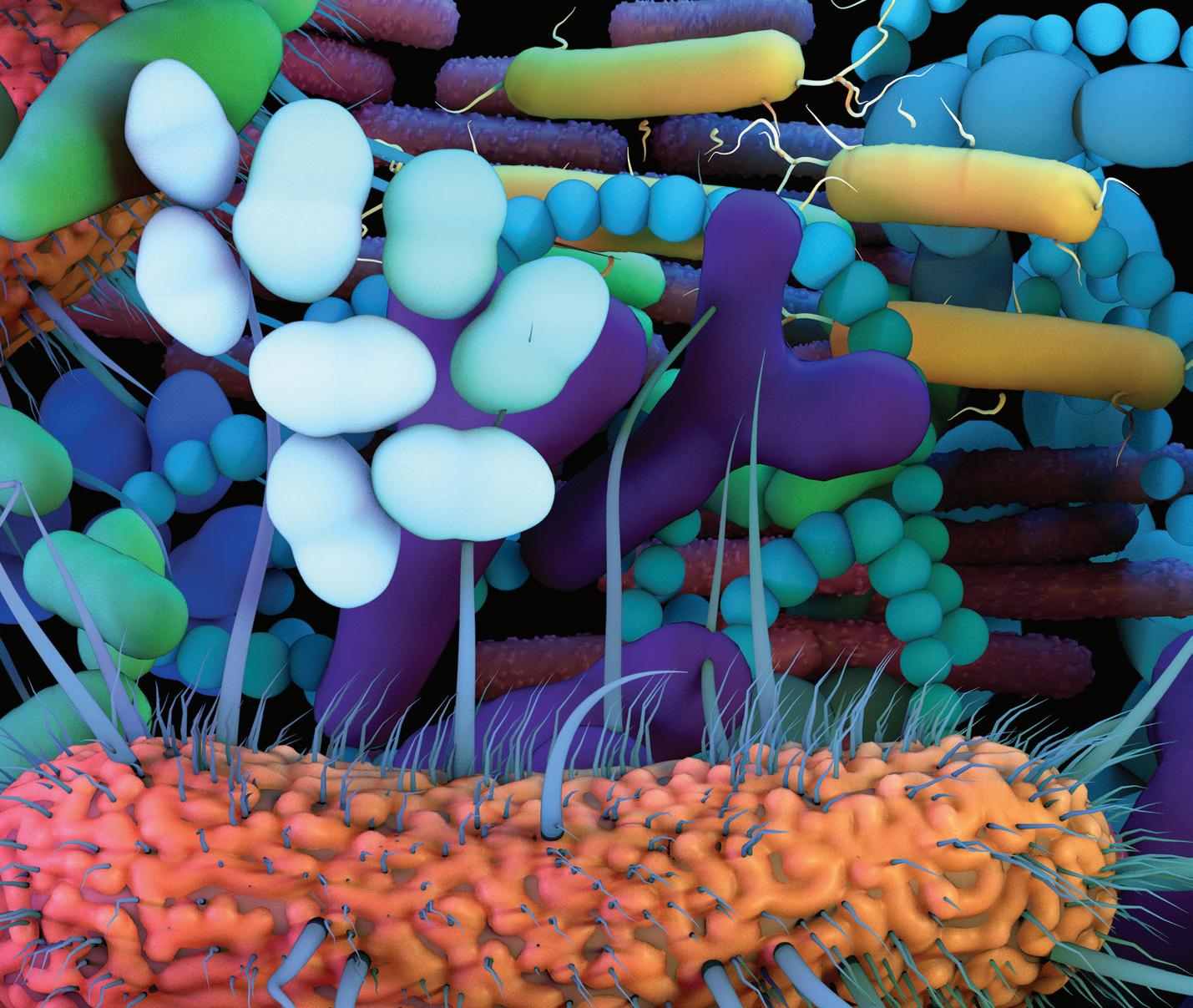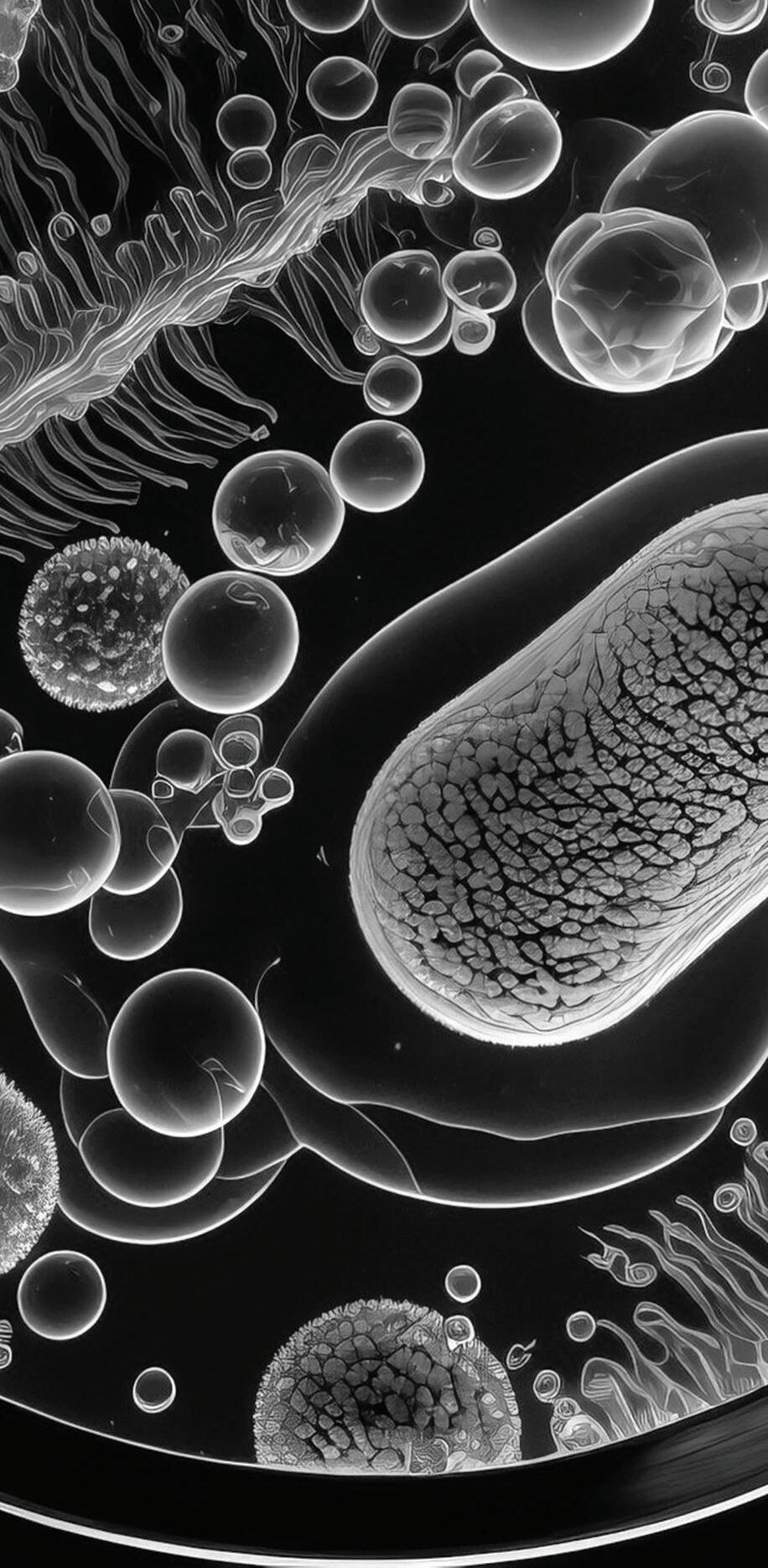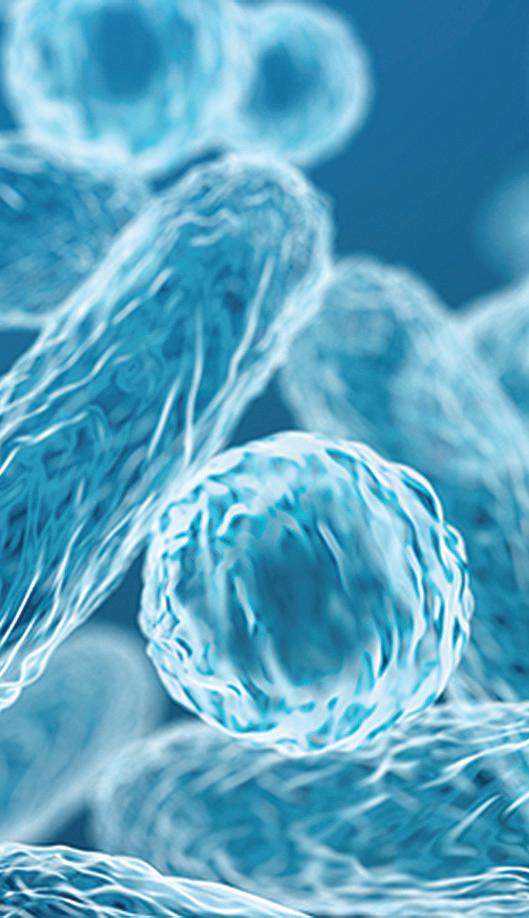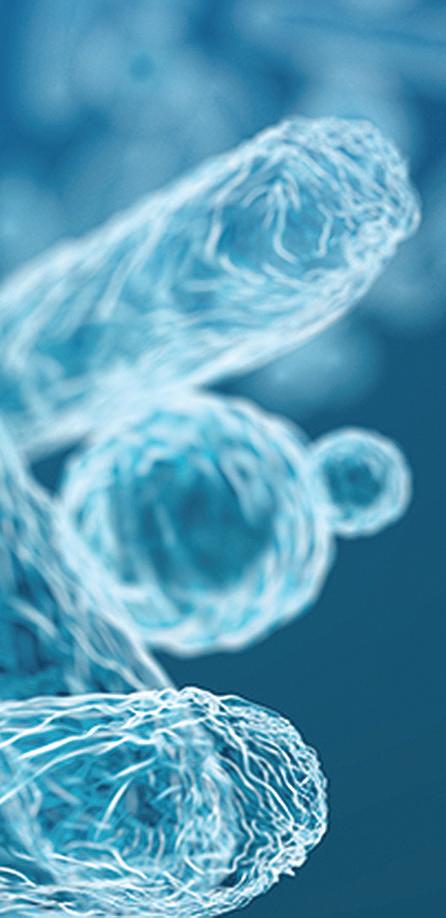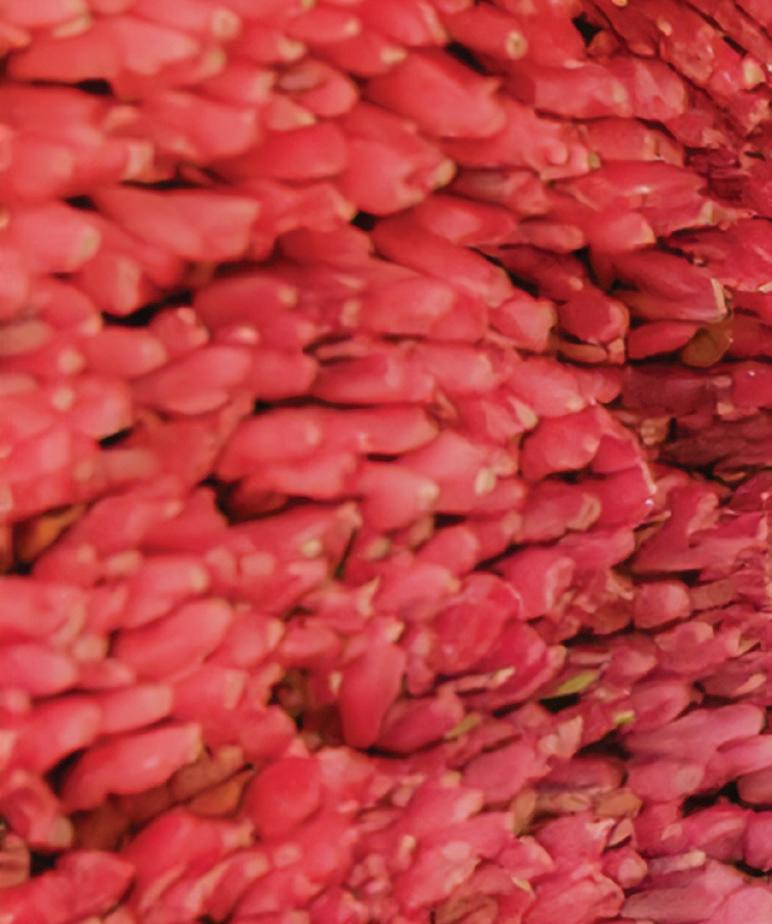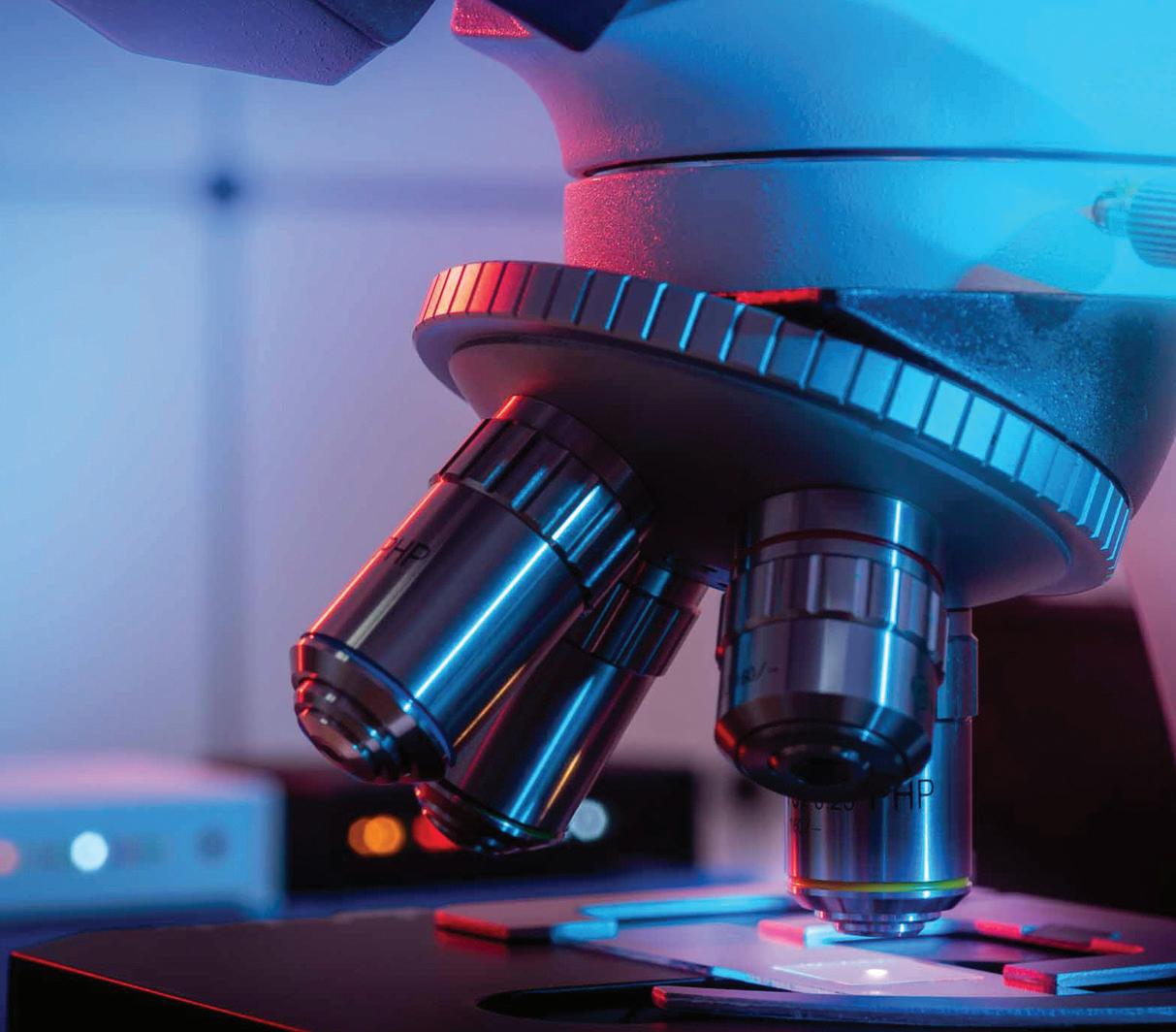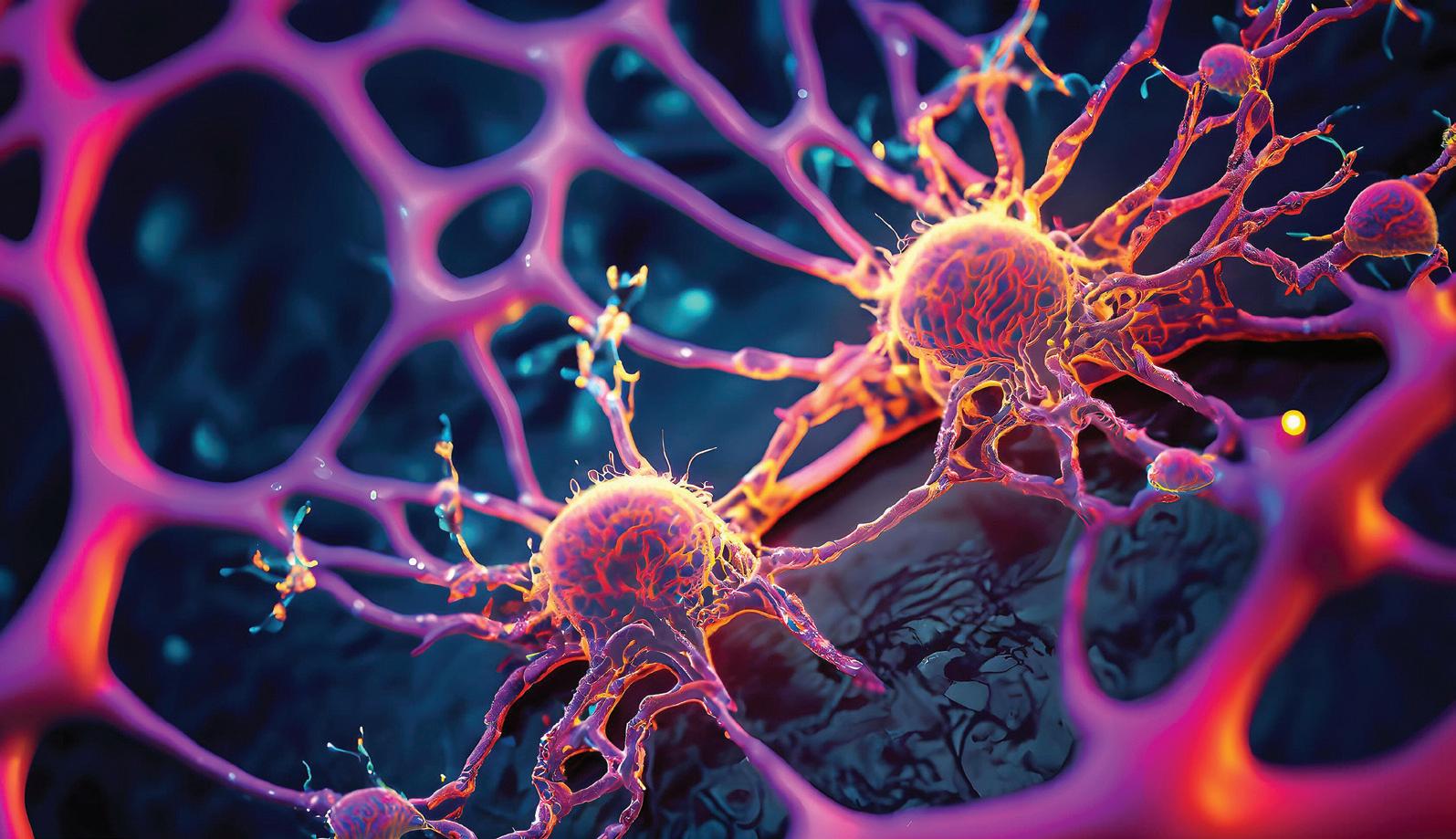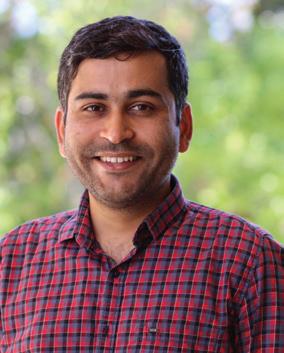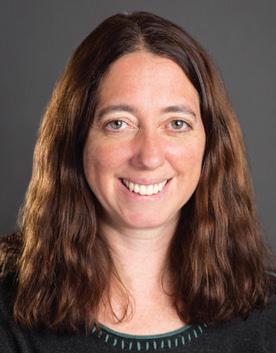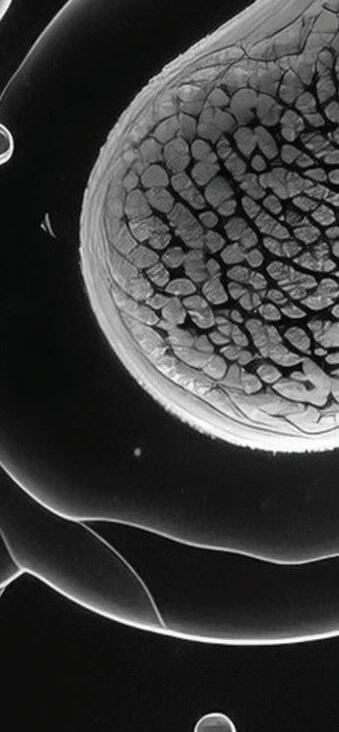2024 ANNUAL REPORT
With Gratitude
The leadership, research faculty, and trainees of MAGIC—Microbiota and Gastrointestinal Immunology Consortium— gratefully acknowledge the financial support of our steadfast and progressive supporters, especially the Department of Internal Medicine and the Department of Pathology at the University of Utah. Additionally, we appreciate the philanthropic resources that define the margin of excellence in academic and research pursuits; the insights and breakthroughs attained by MAGIC researchers, trainees, and physicians would not be possible without the generosity and foresight of our partners. We share their hope and confidence in a brighter, healthier future.
Dear Colleagues and Friends,
The past year has been an exciting start to MAGIC, the Microbiota and Gastrointestinal Immunology Consortium! Time and again, studies illustrate the interconnectedness of gut microbiota and almost every human disease. The microbiota is estimated to weigh as much as one of the most critical organs in our body—the human brain—yet we know very little about the function of this “forgotten organ.” This lack of knowledge is, in part, because the microbiota is a complex ecosystem of microbes that requires interdisciplinary expertise to study it.
In 2024, MAGIC brought together researchers from over 15 different departments across campus to share their work in chemistry, immunology, microbiology, engineering, and much more. These specialists include trainees, basic research scientists, and clinicians. Together, we are beginning to lay the foundation for unlocking new insights from the microbes that hold promise to transform health care and enhance the quality of life for patients worldwide.
The focus of 2024 was to bring together faculty across campus to collaborate in this space and build the infrastructure to allow new investigators to enter the microbiota field. This has already proved to be a successful endeavor, as this past year has brought increased research funding, publication outputs, and new research collaborations. MAGIC began with a focus on critical areas of chronic diseases such as inflammatory bowel disease and gastrointestinal (GI) cancers, and this year saw an expansion into new areas such as neurological and metabolic diseases. Our goal will be to continue growing into other areas of expertise across campus to position the University of Utah as a leader in microbiome research.
We can all agree that one of the University of Utah’s greatest assets is the people and the culture of collaboration that it cultivates. The dedication and passion of our faculty, staff, and partners are the driving forces behind MAGIC’s present and future success. We are excited to continue fostering innovative approaches that harness the power of the gut microbiome for patient care. As we look toward the future, we envision that bringing together individuals focused on patient care with others at the bench making the basic discoveries in microbiota research will more rapidly allow the translation of microbiota-based therapeutics. To support this, we are actively working with business partners and the commercialization office to create the infrastructure to support these future translational efforts. We are confident these efforts will unlock the discoveries critical to developing life-changing treatments—and cures—for some of the most debilitating diseases.
Thank you for your continued support and collaboration. Together, we can make MAGICal discoveries that will pave the way for a healthier tomorrow.
Daniel Leung, MD Co-Director, MAGIC
Dr. Thomas D. Rees and Natalie B. Rees
Presidential Endowed Chair in Global Medicine
Professor, Department of Internal Medicine, Division of Infectious Diseases
June Round, PhD
Co-Director, MAGIC
H. A. and Edna Benning Presidential Endowed Chair Professor, Department of Pathology, Division of Microbiology & Immunology
VISION
MAGIC is dedicated to driving groundbreaking discoveries and fostering innovative research and collaboration to unlock the full potential of microbiome science. By advancing our understanding and applying microbiota-related
MISSION
MAGIC is committed to advancing our understanding of the microbiota’s role in human health. Leveraging the University of Utah’s strengths in cutting-edge research and interdisciplinary collaboration, as well as
STRATEGIC PLAN
MAGIC seeks to become one of the preeminent microbiome research centers in the United States focused on leveraging discoveries to improve human health. To this end, we are focused on transformational research, excellence in education, and strategic collaboration within—and outside— the University of Utah.
MAGIC is proudly housed within the University of Utah’s Departments of Internal Medicine and Pathology, benefitting from the extensive expertise and resources they offer.
The program also benefits significantly from its association with the Immunology, Inflammation, and Infectious Disease (3i) Initiative, formally established at U of U Health in 2017. Since that time, 3i has convened investigators representing nearly every department at the U to focus on conditions such as HIV/AIDS, sepsis, malaria, cancer immunotherapy, IBD, and multiple sclerosis.
WHO WE ARE
LEADERSHIP
RESEARCH FACULTY
MAGIC-affiliated research faculty members are all accomplished and respected in their fields, representing an array of disciplines from across campus. In addition to their extensive research endeavors, they work closely with trainees, mentoring graduate and PhD students, as well as individuals in post-doctoral and fellowship programs.
SCHOOL OF DENTISTRY
Melodie Weller, PhD
JOHN AND MARCIA PRICE
COLLEGE OF ENGINEERING
Alphonsus Ng, PhD
COLLEGE OF HEALTH
Department of Nutrition & Integrative Physiology
Mary Playdon, PhD
Anandh Babu Pon Velayutham, PhD
SPENCER FOX ECCLES
SCHOOL OF MEDICINE
Department of Family & Preventive Medicine
Windy Tanner, PhD
Department of Human Genetics
Charles Murtaugh, PhD
Mark Yandell, PhD
Department of Internal Medicine
Anna Beaudin, PhD
John Inadomi, MD
Karim Khader, PhD
Daniel Leung, MD
Afaf Osman, MD
Kathryn Peterson, MD
Naomi Schlesinger, MD
Andrew Skinner, MD
Amiko Uchida, MD
John Valentine, MD
Department of Obstetrics & Gynecology
Michael Varner, MD
Department of Pathology
Maria Bettini, PhD
Matt Bettini, PhD
Kim Evason, MD, PhD
Hans Haecker, MD, PhD
Gianna Hammer, PhD
Peter Jensen, MD
Ryan O’Connell, PhD
Aaron Petrey, PhD
June Round, PhD
Zac Stephens, PhD
Arabella Young, PhD
Department of Pediatrics
Nicole Pershing, MD, PhD
Intermountain Health Department of Population Health Sciences
Neli Ulrich, PhD
Department of Psychiatry
Shami Kanekar, PhD
Department of Surgery
Irma Fleming, MD
COLLEGE OF PHARMACY
Department of Medicinal Chemistry
Amy Barrios, PhD
Department of Pharmaceutics & Pharmaceutical Chemistry
Yue Lu, PhD
Department of Pharmacology & Toxicology
Ana Beatriz DePaula-Silva, PhD
Jackie Winter, PhD
COLLEGE OF SCIENCE
School of Biological Sciences
Fred Adler, PhD
Colin Dale, PhD
Denise Dearing, PhD
Bryn Dentinger, PhD
Talia Karasov, PhD
Matt Mulvey, PhD
Department of Chemistry
Ming Hammond, PhD
OFFICE OF THE VICE PRESIDENT FOR RESEARCH
Office of Comparative Medicine
Alton Swennes, DVM
HUMAN MICROBIOTA–IMMUNE CONNECTION
The human body is home to an abundant and diverse assortment of resident bacteria, fungi, and viruses called the microbiota. The number of these organisms in the average human body equals the number of human cells and contains ten times more genetic material than the human genome.
These microbes are now understood to play important roles in human metabolism, immunity, chronic illness, and protection from infection. Understanding how these organisms influence human health has the potential to unlock new therapies to prevent and treat disease. The following conditions have demonstrated links to microbiome health and are of primary interest to MAGIC researchers.
Eosinophilic Gastrointestinal Diseases
Eosinophilic gastrointestinal diseases (EGIDs) are chronic allergic inflammatory diseases of the GI tract that are increasingly common and have few to no therapies. Researchers at the U are working to understand how environmental factors like diet and microbiota impact human health in the setting of EGIDs.
Gastrointestinal Cancer
Most of the microbes in our bodies live in the GI tract. Of these, many have been shown to influence cancer development at sites within the GI tract, including the liver, pancreas, gall bladder, small intestine, and colon. Moreover, many of these cancers are developing in younger individuals and increasing in incidence in countries around the globe.
Inflammatory Bowel Disease
Inflammatory bowel disease (IBD), including Crohn’s disease and ulcerative colitis, has also been steadily rising in incidence worldwide. An estimated 1:123 people will receive this diagnosis, posing a tremendous burden for health care systems as there is currently no cure, and many existing therapies are quite expensive. Individuals with IBD are more likely to develop colon cancer and experience a severe, constant burden on their quality of life, social interactions, and ability to work. Despite the advancements in therapies for IBD over the last decade, many patients quickly become unresponsive to treatment. While the cause of IBD remains unknown, it seems clear that microbiota composition is a critical aspect of its development.
Intestinal Infections
Virtually all pathogenic agents must cross a mucosal barrier to infect their host. Mucosal sites, such as the mouth, lung, and GI tract, are also home to trillions of microbes. Thus, the interactions between these microbes and the immune system at mucosal sites are instrumental in combating and preventing infectious agents. Researchers at the U are studying how gut bacteria can prevent pathogenic organisms, such as COVID-19, from causing severe disease and uncover the unique immune pathways that fend off harmful microbes.
Metabolic Diseases
Obesity and diabetes are reaching epidemic levels. While dietary interventions are known to improve these diseases, these interventions do not always work. What we consume or which medications we take can influence the communities of bacteria within the gut. Understanding how microbes and nutrition affect the development of diabetes and obesity can help physicians and practitioners identify novel strategies for treatment. Research at the U has uncovered gut microbes that can prevent obesity, nutritional supplements that improve metabolic health, immune pathways that elicit diabetes, and gut microbial molecules that might temper the development of diabetes.
Neurological Diseases
Many individuals with neurological disorders, including autism, multiple sclerosis, Parkinson’s disease, and stroke, have co-occurring GI symptoms. This clinical observation suggests that many of these disorders connect to gut health. Data now supports this observation, demonstrating that the microbes that reside within the gut can influence the severity of many of these diseases. Moreover, immune cells within the intestine are capable of trafficking to the central nervous system (CNS) to prevent or exacerbate disease. This knowledge highlights that GI health is an instrumental aspect of neurological health.
TRANSFORMATIONAL RESEARCH
The University of Utah and University of Utah Health have built an innovative research environment that encourages scientists to work together to turn big ideas into real solutions. This collaborative spirit, along with state-of-the-art facilities and dedicated support, enables researchers at all career stages to expedite discoveries that meet the most urgent needs of our time.
Operating in conjunction with U of U Health, including five hospitals and 12 community health centers, and embedded within a major public research university, MAGIC researchers have the ability to accelerate the translation of laboratory discoveries into clinical therapies. Additionally, the collaborative nature of MAGIC means that as research becomes ever more interdisciplinary, its strong foundation of strategic partnerships across university programs, departments, and colleges and with local and national health systems will be increasingly critical to the U’s research enterprise.
MAGIC is uniquely positioned to harness these assets to benefit human health and well-being.
BIOLOGICAL SCIENCES
BIOMEDICAL ENGINEERING
CHEMISTRY
COMPUTER SCIENCE
DENTISTRY
FAMILY & PREVENTIVE MEDICINE
HUMAN GENETICS
INTERNAL MEDICINE
MEDICINAL CHEMISTRY
NUTRITION & INTEGRATIVE PHYSIOLOGY
OBSTETRICS & GYNECOLOGY
OFFICE OF COMPARATIVE MEDICINE
PATHOLOGY
PEDIATRICS
PHARMACEUTICS & PHARMACEUTICAL CHEMISTRY
PHARMACOLOGY & TOXICOLOGY
POPULATION HEALTH SCIENCES
PSYCHIATRY
SURGERY
19 DEPARTMENTS AND DIVISIONS
MAGIC Biobank
Microbiome biobank samples play a crucial role in advancing scientific research. These samples enable researchers to investigate the diverse microbial communities present in the human body, facilitating the identification of specific microorganisms that may contribute to various diseases or health conditions.
2024 RESEARCH
$21.9M
By analyzing biobank samples, scientists can uncover patterns and correlations that help in understanding the role of the microbiome in metabolic disorders, autoimmune diseases, GI issues, and more. Biobanks also strengthen connections among researchers, allowing for large-scale studies that increase the statistical power of findings and expedite the discovery of potential therapeutic targets. Ultimately, microbiome biobank samples serve as a foundational resource for developing personalized medicine approaches, improving patient outcomes, and guiding future innovations in health care.
The MAGIC Biobank is a collection of biospecimens from GI or GI surgery patients dedicated to advancing translational research to improve GI health. The U has received roughly $2 million annually in NIH awards related to the MAGIC Biobank. The biobank is made possible through a partnership between the Departments of Internal Medicine and Pathology and the 3i Initiative.
Long-term, the vision for the MAGIC Biobank is to be a one-of-a-kind longitudinal collection site focused on human microbiome biospecimens across the lifespan. These samples, ranging in type from maternal, fetal, and infant through adulthood, will leverage the Utah Population Database to help provide genealogical information. All of these samples combined will create a powerful set of data that can be used to tackle the seemingly impossible questions of environment and genetics.
EXCELLENCE IN EDUCATION
MAGIC joins U of U Health in its commitment to providing outstanding multidisciplinary and innovative research training that prepares our diverse predoctoral and postdoctoral trainees to become successful scientists in a rapidly evolving and complex research enterprise. The experiences and insights trainees gain through their work with MAGIC complement the robust curricula offered by the University of Utah that cover the basic, diseaserelated, clinical, and/or translational disciplines and provide the foundation for research experiences. Along with novel programmatic activities, strong mentoring, and responsible oversight, our programs facilitate development toward independent research careers by ensuring that trainees acquire the operational and professional skills to advance knowledge and improve health for all the citizens we serve.
MAGIC Associated Learners
As chronic diseases such as diabetes, obesity, and inflammatory bowel disease continue to rise globally, there is an urgent need for more microbiota researchers and clinicians who can develop innovative treatments and preventive strategies. Advancing our understanding of the impact of microbiota on these and other chronic diseases is essential for improving health outcomes. To address this need, the MAGIC Associated Learners— MAGICAL—program at the U is committed to training the next generation of researchers in the field.
Recognizing the need for specialized training programs directly focused on the microbiome, the initiative aims to equip mentees with the skills and knowledge required to make meaningful contributions to this rapidly evolving field. Our approach integrates basic wet lab research with computational skills, ensuring trainees can translate research discoveries into impactful clinical tools.
To achieve our training goals, the MAGICAL program will leverage the strengths of several institutional programs and communities at the University of Utah. The Microbiota and Gastrointestinal Immunology Consortium (MAGIC) provides interdisciplinary training expertise through a network of over 40 investigators from nearly 20 departments. The Immunology, Inflammation, and Infectious Diseases (3i) Initiative unites over 280 investigators across the U’s campus to enhance research efforts through pilot projects, strategic recruitments, seminars, and symposia. The Mountain West Microbiome Alliance (MoWMA) convenes investigators from six institutions across the Mountain West and supports interdisciplinary and multi-institutional research and training in microbiota science.
MAGIC Associated Learners
Future training plans prioritize the following goals:
Maximize external training support for PhD trainees, MD-PhD trainees, and postdocs
Develop systems to support the growth and excellence of graduate programs
Train the next generation of clinician-scientists
Increase the success of graduate students
Strengthen postdoctoral support and mentoring
Create a standard of mentoring
2024 MAGIC Recruiting Highlight
Jean-Bernard Lubin, PhD
Jean-Bernard Lubin, PhD, is an assistant professor of pathology specializing in microbial genetics and biochemistry. Before joining the U, Dr. Lubin completed his undergraduate studies at the State University of New York, where he earned a bachelor of science degree. He then pursued his doctoral training at the University of Delaware, where he obtained his PhD. Dr. Lubin further honed his expertise through a postdoctoral fellowship at the Children’s Hospital of Philadelphia. His research interests include mucosal immunology and early-life hostmicrobiota interactions, making significant contributions to the field of microbial genetics.
STRATEGIC COLLABORATION
Robust and strategic collaborations provide opportunities to develop and share a common understanding of MAGIC’s efforts and relevance to stakeholders, potential partners, and the broader community. Building this connectivity is important and is a priority for MAGIC in 2025.
MoWMA: Mountain West Microbiome Alliance
Thanks to a generous donation from the Cumming Foundation, the Mountain West Microbiome Alliance (MoWMA) was established in 2023. This initiative fosters collaboration and innovation among microbiome researchers across the Mountain West. The annual regional meeting, held each spring, convenes specialists from various institutions, including the University of Colorado, the University of Montana, and the University of Arizona.
The three-day event maximizes both formal and informal interactions among participants. Through presentations, researchers share their latest findings, methodologies, and insights into microbiome science. These lectures cover a wide range of topics, from basic research to clinical applications, providing a comprehensive overview of the current state of the field.
MoWMA also includes numerous opportunities for informal discussions. These sessions encourage spontaneous idea exchanges, foster new collaborations, and strengthen existing partnerships. Activities such as roundtable discussions, poster sessions, and networking events are integral parts of the meeting, allowing participants to engage in meaningful conversations and explore potential joint projects.
The Mountain West Microbiome Alliance serves as a vital platform for advancing microbiome research in the region. By bringing together a diverse group of scientists and fostering a collaborative environment, MoWMA aims to accelerate the pace of discovery and innovation in microbiome science, ultimately contributing to improved health outcomes and a deeper understanding of the microbiome’s role in human health.
Gary D. Wu, MD Associate Chief for Research, Division of Gastroenterology, Hospital of the University of Pennsylvania
Jennifer B.H. Martiny, PhD Professor, Ecology & Evolutionary Biology, School of Biological Sciences, University of California, Irvine
Zachary Abbott, PhD Co-Founder, ZBiotics
2024 MoWMA KEYNOTE SPEAKERS
2023 MoWMA SEED GRANTS
In December 2023, three projects were awarded seed grants by the Cumming Foundation, and their work commenced in 2024. These studies, led by University of Utah and Colorado State University researchers, are unlocking key insights into autoimmune, behavioral, and neurological conditions.
Dynamics of Diet-Induced Microbial Metabolites in Eosinophilic Esophagitis
PI: Amiko Uchida, MD—University of Utah
The project aims to understand how diet affects microbial byproducts that can influence immune system function. The team is investigating these immune system effects in the context of a common but poorly understood allergic disorder that affects the esophagus to improve treatment for this condition.
Modulating Age-Associated Changes in the Meninges of the Brain by Altering the Life Experience of the Gut
PI: Gianna Hammer, PhD—University of Utah
The team is investigating how signals originating from gut microbes can affect immune cells in the brain’s lining as individuals age. These immune cells can have an impact on anxiety-like behaviors, social behaviors, and neurodegenerative disorders like Alzheimer’s disease.
Diet and Microbiome Interactions: Application in Post-Traumatic Stress Disorder
PI: Tiffany Weir, PhD—Colorado State University
Inflammation is a risk factor for stress- and trauma-related disorders like PTSD, and signals from the microbiome can either trigger or relieve inflammation, depending on which microbes are present. The team will investigate this connection further by measuring the effects of a diet that includes a high diversity of plants on microbiome diversity, inflammation, and quality of life for people with PTSD.
MAGIC Campus Outreach
Enhancing an engaging, vibrant, and dynamic environment is a primary goal of MAGIC’s regular seminars and interest group gatherings, which provide a platform for researchers, clinicians, and students to share their latest findings, discuss innovative ideas, and explore new avenues in microbiome science. These initiatives promote knowledge sharing and professional development and drive the interdisciplinary efforts necessary to achieve groundbreaking discoveries in microbiome science. Two seminar series launched in 2024: the MAGIC Interest Group Seminar and the MAGIC Seminar. These series were very successful, and they will continue in 2025. A fall 2025 symposium is also planned.
2024 MAGIC Interest Group Seminar Series
• September 26: Microbiota-Immune Interactions that Promote Metabolic Health and Microbiota Mediated Control of Ribosomal Translation in T Cells
• October 24: Exploring Novel Roles for miRNAs in Gastrointestinal Disease
• November 14: Tools to Study Signaling, Antibiotic Resistance, and RNAs in Bacteria
2024 MAGIC Seminar Series
• September 27: Breastfeeding, Gut Microbiota, and Infant Health: A Perspective from the Bench
• November 15: Deconstructing Mechanisms of Diet-Microbiota-Immune Interactions in Autoimmunity
2024 MoWMA SEED GRANTS
In December 2024, three interdisciplinary research teams received seed grants to drive new investigations into how the microbiome affects health. By powering partnerships between researchers at the U and other institutions, the grants, funded by the Cumming Foundation, will foster intellectual collaboration as they spark breakthroughs.
By unraveling the dynamic interactions between human health and our complex microbial ecosystems, the funded research will ultimately help improve health care, according to Ryan O’Connell, PhD, professor and chief of microbiology and immunology at U of U Health. “The work to be supported by these seed grants will enable key advances in our understanding of critical areas of human health that clearly involve the microbiota,” Dr. O’Connell says. “These initial steps will undoubtedly pave the way for the development of novel approaches to diagnose and combat autoimmunity and infectious disease in the clinic.”
RESEARCH TEAM
Vineet Pandey, PhD
Assistant Professor, Kahlert School of Computing, University of Utah
Catherine Lozupone, PhD
Associate Professor, Interdisciplinary Quantitative Biology, University of Colorado (CU) Anschutz Medical Campus
Promoting Citizen Science in Multiple Sclerosis Patient Communities
In multiple sclerosis (MS), the body’s immune system attacks the nervous system, causing severe symptoms that can include fatigue, sensory and movement problems, and changes to emotion or cognition. Understanding that the gut microbiome can affect both the immune and the nervous systems, the researchers began to consider whether lifestyle changes affecting the microbiome also impact MS symptoms.
To answer this complex question, the team will enlist the help of people with MS, whose expertise stems from daily life, to start making hypotheses about how lifestyle impacts the microbiome and MS symptoms. After modifying an existing digital citizen science platform, “Gut Instinct,” the team will deploy it to help people explore how different lifestyle activities and having MS (or not) are associated with changes in the microbiome. The goal is to bring MS communities into the conversation with a cheap, accessible digital tool that prioritizes lived experience.
RESEARCH TEAM
June Round, PhD Professor, Pathology, University of Utah
Learning How Viruses Change Bacterial Behavior
Some common gut bacteria are usually harmless but can also cause diseases like IBD, raising the question of what triggers such microbes to cause health problems. The team will investigate whether one contributing factor could be viruses called bacteriophages, which infect gut bacteria but leave human cells alone.
Patrick Secor, PhD Associate Professor, Microbiology and Cell Biology, Montana State University
Although bacteriophages don’t infect human cells, they can prompt an immune reaction that may prevent their host bacteria from producing harmful substances. The research team will further investigate this phenomenon by comparing how the immune system responds to the same bacteria in people with and without IBD, discovering which bacteriophage genes make a difference in this interaction, and testing if the immune response affects the viruses.
Breck Duerkop, PhD Associate Professor, Immunology and Microbiology, CU Anschutz Medical Campus
Kyla Ost, PhD Assistant Professor, Immunology and Microbiology, CU Anschutz Medical Campus
James Colbert, MD Assistant Professor, Infectious Disease, CU Anschutz Medical Campus
Investigating Microbial Contributors to Sepsis Risk
Sepsis, a severe, whole-body immune response to infection, is difficult to predict and often deadly. It typically starts when bacteria in the gut microbiome end up elsewhere in the body. Though many bacteria can cause it, one bacterial species will usually dominate in a given patient. Researchers have extensively investigated the aspects of patient health that impact sepsis risk, but what makes a bacterial species more likely to become dangerous is relatively unknown.
Daniel Leung, MD Professor, Internal Medicine, University of Utah
Seth Walk, PhD Professor, Microbiology and Immunology, Montana State University
The research team posits that the answer may have to do with the genetic diversity of each bacterial species. If a single bacterial species is more genetically diverse, they suspect, it’ll be more likely to thrive and expand, to the patient’s detriment. To test their hypothesis, they’ll compare gut microbiome samples from people with and without sepsis and ask if there are differences in withinspecies genetic diversity.
“We’re trying to build a community of people who are not siloed...”
FEATURE
Meeting of the Minds: David Cumming didn’t just fund microbiome research at the U; he united researchers across the region to further the field.
The 2025 edition of UtahMed, the alumni magazine for the Spencer Fox Eccles School of Medicine, is highlighting David Cumming’s commitment to microbiome research—and uniting the scientists and physicians who will take discoveries directly to patients.
“Because the microbiome is new in terms of research, we have the opportunity to come out of the box a little differently than other sciences that have been around for a long time,” Cumming said. “And what that means specifically is that we’re trying to build a community of people who are not siloed and who are eager to share their information, resources, and will be released later this spring. are available online at utahmedicine.org.
